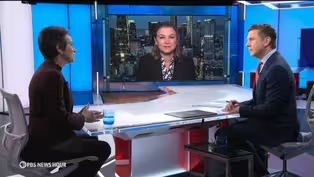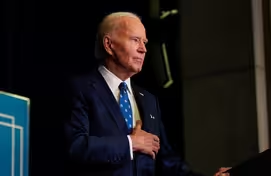
China's adoption ban leaves children and families in limbo
Clip: 12/23/2024 | 9m 22sVideo has Closed Captions
China's foreign adoption ban leaves hundreds of children and families in limbo
China’s announcement in September that it was ending international adoptions was a crushing blow for families awaiting the arrival of their adopted children. The policy change has now left more than 270 American families in limbo, unsure of where their adoption journey will lead. Stephanie Sy reports.
Problems playing video? | Closed Captioning Feedback
Problems playing video? | Closed Captioning Feedback
Major corporate funding for the PBS News Hour is provided by BDO, BNSF, Consumer Cellular, American Cruise Lines, and Raymond James. Funding for the PBS NewsHour Weekend is provided by...

China's adoption ban leaves children and families in limbo
Clip: 12/23/2024 | 9m 22sVideo has Closed Captions
China’s announcement in September that it was ending international adoptions was a crushing blow for families awaiting the arrival of their adopted children. The policy change has now left more than 270 American families in limbo, unsure of where their adoption journey will lead. Stephanie Sy reports.
Problems playing video? | Closed Captioning Feedback
How to Watch PBS News Hour
PBS News Hour is available to stream on pbs.org and the free PBS App, available on iPhone, Apple TV, Android TV, Android smartphones, Amazon Fire TV, Amazon Fire Tablet, Roku, Samsung Smart TV, and Vizio.
Providing Support for PBS.org
Learn Moreabout PBS online sponsorshipWILLIAM BRANGHAM: Over the last 25 years, more than 80,000 Chinese children have been adopted by U.S. families, but that has come to an abrupt halt because China announced this fall that it is bringing its foreign adoption program to an immediate end.
As Stephanie Sy reports, the futures of hundreds of Chinese children now hang in the balance.
STEPHANIE SY: The Welches live in Louisville, Kentucky and are raising four biological sons, as well as a daughter, Grace, whom they adopted from China in 2017.
But they consider themselves a family of eight.
Penelope, who lives in an orphanage in China, is the missing piece.
Using an international adoption agency, the Welches were matched with Penelope in 2019, when she was 5 years old.
For her privacy, the Welches asked that we not show her face.
AIMEE WELCH, Mother: Her caregivers wanted to prepare her for the transition that was coming, and they told her that she had parents and four big brothers and a little sister.
She received photos of us.
She began to refer to us then as mommy and daddy, mama and baba.
STEPHANIE SY: COVID struck weeks before they were due to go to China to meet Penelope in person, finalize her adoption and bring her back to the U.S. With China implementing one of the strictest lockdowns in the world, the trip was canceled.
AIMEE WELCH: Penelope's soft pink bed has been set up since Chinese new year in January of 2020.
STEPHANIE SY: Five years since Penelope and the Welches were promised to each other, the little girl's bed in Kentucky still sits empty.
Now 11, Aimee estimates she has grown several sizes, holding the original outfit she bought for her homecoming and the new larger one next to it.
Back in China, Penelope still receives photos of the family, some printed on pillows and blankets she cuddles up to.
"I love you," she says in Mandarin, in a video message the orphanage sent.
AIMEE WELCH: It is not a perfect connection, but it is a real connection.
And we think of her very much as the daughter of our hearts.
STEPHANIE SY: If COVID was a setback, China's announcement in September that it was ending international adoptions was a crushing blow.
AIMEE WELCH: So, how is everyone doing?
STEPHANIE SY: Ever since, Aimee has been organizing families in the same situation.
They have been pleading their case for China to honor the pending adoptions.
In Penelope's case, it was a promise made with signatures and a stamp of approval from the China Center for Children's Welfare and Adoption.
The policy change has left more than 270 American families in limbo, unsure of where their adoption journey will lead.
In November, U.S. lawmakers from both parties wrote a letter to President Biden, urging him to act in the best interest of these children and families by urging the PRC to fulfill and uphold the commitment the country has made.
A State Department spokesperson told the "News Hour," "We deeply sympathize with the families and children" and that it's engaging with the PRC at high levels to advocate for U.S. families to be able to process their adoptions.
International adoptions in China were once common.
During the one child policy, which lasted from 1980 to 2016, families abandoned or were forced to give up children, especially baby girls.
Tens of thousands of babies were adopted by American families.
KIRA OMANS, Adoptee: I was born in September of 1995.
I was found by the side of a bridge, brought to the welfare home, and none of my natural relatives could be found.
STEPHANIE SY: Kira Omans was 10 months old when she was adopted.
The 29-year-old actress now lives in Los Angeles.
How would you describe how you feel about your adoption now that you know about the one child policy?
KIRA OMANS: Adoption has impacted my life in so many different ways that I could have never anticipated.
I have very loving parents.
However, even so, as someone who I feel like is very well-adjusted in that way, I still struggle with a lot of aspects of my adoption and the grief and the trauma that comes with being separated from your birth country, from your birth family.
STEPHANIE SY: Katie Lauder, now 28, was adopted just before she turned two by a family outside Chicago.
KATIE LAUDER, Adoptee: We grew up in a time when it wasn't really taught to adopted parents how much inherent trauma there is in adoption, being separated from your first family, the people that are supposed to care about you and have some type of connection to you.
STEPHANIE SY: Lauder works with other adoptees who want to travel to China in search of relatives.
Her own journey to discover her origins was bittersweet.
KATIE LAUDER: I was able to reconnect with the foster family that raised me for a year.
It was a little sad because my foster mother had already passed away by the time that I was able to find the family.
So that was a bit devastating, because I kind of just lost the one person who knew me at the earliest point in my life.
STEPHANIE SY: Both Omans and Lauder had strong reactions to China's decision to end international adoptions.
KIRA OMANS: I both knew that this was a step towards prioritizing family preservation, which is an element of adoption that I very much believe in and fight for.
At the same time, as a woman adopted during the one child policy, didn't necessarily feel that this decision was made purely for the betterment of children, and that also led to conflicting feelings surrounding this decision.
KATIE LAUDER: Like, my cohort of adoptees feel a bit of relief and some vindication.
But then there's also the other side of the community who were adopted in the late 2000s to the 2010s.
A lot of those children were medical needs or disabled children, so they have a lot of sadness around the closing of international adoptions.
STEPHANIE SY: Aimee and Steve did not think it was in Penelope's best interest to reveal her medical condition.
AIMEE WELCH: We know that, with her medical diagnosis, she is not a candidate for domestic adoption.
It is a condition that she will live with her whole life.
It's a condition that is highly stigmatized in China.
STEPHANIE SY: But, with each passing day, Aimee worries Penelope's window to be with a permanent family grows smaller.
AIMEE WELCH: Every single one of these 300 children, including our Penelope, has a moderate to severe special need.
This has been an incredibly hard wait for us and for the hundreds of other families.
But what is far harder is to be an orphan, to have lost your family of origin, to grow up in institutional care.
STEPHANIE SY: There are more than 150,000 orphans in China, and 98 percent of those in state orphanages have moderate to severe disabilities or diseases.
A tiny fraction of them will be adopted in China, says Yanzhong Huang, an expert on China's rolling global health policy at the Council on Foreign Relations.
YANZHONG HUANG, Council on Foreign Relations: So, clearly, there's the shortage of the state capacity, right, to take care of those children, and -- but, unfortunately, the Chinese families, because they would prefer adopting healthy children or minor -- children with minor illness, so they also -- they don't have interest, right, in adopting these children.
STEPHANIE SY: Back in Louisville, the Welches' first Chinese adopted daughter seems as healthy as they come, despite her physical disability.
AIMEE WELCH: She's thriving, not because of us.
Like, we're just ordinary parents.
We're just doing what ordinary parents do.
What have you been telling Grace?
Because, from a child's perspective, she thought she had a sister coming home.
STEPHEN WELCH, Father: She doesn't remember a day where she wasn't waiting for Penny to come home, so nightly prayers.
It's open the door for Penny to come home.
We did share with her the news in September, and there were tears all around the table as we communicated that, and we said we're not going to give up, but we also need to be realistic that we don't control the situation.
STEPHANIE SY: As a new year approaches, the Welches say all they can do is continue to speak out for Penelope, hoping someone who has the power to change the situation will hear them soon.
AIMEE WELCH: One missing piece.
(CHEERING) STEPHANIE SY: For the "PBS NewsHour," I'm Stephanie Sy in Louisville, Kentucky.
Arturo Sandoval on falling in love with music
Video has Closed Captions
Clip: 12/23/2024 | 9m 33s | Arturo Sandoval on falling in love with music and his journey to international fame (9m 33s)
Candy Cane Lane lights up St. Louis
Video has Closed Captions
Clip: 12/23/2024 | 2m 37s | Candy Cane Lane lights up St. Louis and brings the true meaning of Christmas (2m 37s)
House report on Matt Gaetz alleges rampant illegalities
Video has Closed Captions
Clip: 12/23/2024 | 4m 25s | House report on former Rep. Matt Gaetz reveals rampant sexual misconduct, drug use (4m 25s)
News Wrap: Luigi Mangione pleads not guilty to CEO's murder
Video has Closed Captions
Clip: 12/23/2024 | 4m 26s | News Wrap: Luigi Mangione pleads not guilty to murdering head of United Health Care (4m 26s)
Researchers race to answer questions about wind energy
Video has Closed Captions
Clip: 12/23/2024 | 8m 49s | Researchers race to answer questions about the unintended consequences of wind energy (8m 49s)
Tamara Keith and Amy Walter on Biden's moves, GOP's fissures
Video has Closed Captions
Clip: 12/23/2024 | 8m 27s | Tamara Keith and Amy Walter on Biden's big moves and the Republicans’ funding fight (8m 27s)
Why Biden commuted the sentences of 37 people on death row
Video has Closed Captions
Clip: 12/23/2024 | 5m 29s | Why Biden commuted the sentences of 37 people on federal death row (5m 29s)
Providing Support for PBS.org
Learn Moreabout PBS online sponsorship
- News and Public Affairs

FRONTLINE is investigative journalism that questions, explains and changes our world.

- News and Public Affairs

Amanpour and Company features conversations with leaders and decision makers.












Support for PBS provided by:
Major corporate funding for the PBS News Hour is provided by BDO, BNSF, Consumer Cellular, American Cruise Lines, and Raymond James. Funding for the PBS NewsHour Weekend is provided by...






